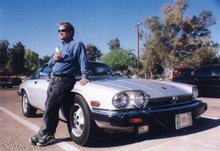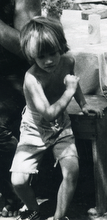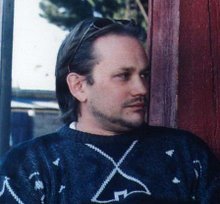Digging a little deeper...into The Secret.
In working on the previous posts I've discovered an extraordinary new intellect...deeply influenced by the transpersonal and integral psychology of Ken Wilber...
"Julian Walker is a respected yoga teacher known for his integrally-informed approach to transformation, healing, bodywork, psychotherapy, and spirituality. He also maintains an active blog on Zaadz.com, and some of his recent posts regarding the pop-spiritual phenomenon known as “The Secret” caught our attention. Although clearly not alone in expressing concerns about The Secret, we found Julian’s views to be remarkably comprehensive, precisely because it's based in large measure on an explicitly integral framework."
21st Century Spirituality: Intention and Depth - Julian Walker
I sincerely hope I am am not stepping over the line in quoting too much of Mr. Walker from his blog at Exploring “The Secret.” Part 1. The Tricky Business of Creating Your Own Reality...if so somebody please nail me and I will quickly take it down...or for God's sake at least visit his blog and hear him out. My extensive quote below is in the spirit of his statement on his recent You Tube posting...click here... that the spiritual community needs nothing more than "good debate, critical thinking, and really getting in there and talking about the issues of the day." Forthwith:
"The Secret, which can be found in both DVD and book form, has managed to hit #1 on the New York Times bestseller list, and maintain a firm grip on the top two spots at Amazon.com, Barnes and Noble, and Borders for weeks. The central tenet of The Secret is “The Law of Attraction,” whereby one’s feelings and thoughts quite literally attract, manifest, and create real events in one’s life—the assumption being that most of us do this unconsciously, and making this process conscious is “The Secret” that “has travelled through centuries to reach you.”As Ken and Julian agree, what can be so tricky when evaluating a new approach such as The Secret, is that at first glance it can appear fairly innocent, even if lacking any kind of critical depth. If it’s helping people feel empowered and positive about their lives, what’s the problem?Well, the problem is that it’s not a basically solid approach with room for improvement, it’s a fundamentally confused way of understanding reality that misunderstands and contorts the genuine truths that it intuits. Some of the central points that Julian and Ken discuss are as follows:
• As with any “you create your own reality” schema, The Secret fails what can be called “the Auschwitz test.” According to The Secret, everyone who was murdered at Auschwitz—or Rwanda, or Darfur—created that reality for themselves, and therefore they are to blame for their fate. For obvious reasons, this position is an unconscionable as it is untenable.
• By teaching that the world quite literally revolves around you, The Secret encourages and entrenches narcissism. In developmental psychology, narcissism doesn’t mean an unhealthy obsession with thinking only about yourself, it means you can’t think about yourself. The capacity for self-reflexive awareness just isn’t there. The entire world and everyone in it is simply an extension of your-self, and you are literally unable to take the perspective of another human being. This is not mystical union; this is pre-rational fusion, and without the ability to take the perspectives of other sentient beings, the entire foundation for ethics evaporates.
• Actually, you are creating the universe moment-to-moment, but it’s not the “you” that you think. According to the great contemplative traditions, every person has at least two “selves”: the finite, temporal, egoic self-sense, and the infinite, transcendental, unqualifiable Self, or I-AMness. Your Self, your I-AMness, is indeed giving rise to the entire radiant Kosmos in this and every moment, but The Secret teaches that your separate self has the power to personally manifest a new car, win the lottery, or cure cancer… and this simply isn’t how things work.
• “The Law of Attraction” is true—as far as it goes. The problem is that The Secret takes this one relatively small piece of the puzzle and makes it the entire puzzle. A positive outlook will change your life and your intentions will co-create your reality, but so will brain chemistry, interior level of development, family relationships, natural disasters, cultural trends, language structure, environmental toxins, and, basically, the slings and arrows of outrageous fortune.
• Developmentally, if one uses a scale ranging from archaic to magic to mythic to rational to pluralistic to integral to super-integral, The Secret teaches the magical thought structures that were humanity’s leading edge several hundred thousand years ago. As Ken explains, The Secret encourages childlike “primary process thinking,” which can be in the form of “the law of attraction” (e.g., if one black thing is bad, then all black things are bad) and “the law of contagion” (e.g., if this particular man was powerful, then a lock of his hair must be powerful too).
• The importance of understanding how unconscious psychological shadow elements color and affect one’s experience, and how The Secret can agitate, alienate, repress, or—perhaps even more worrisome—act on these disowned elements of consciousness.
• The genesis of the pre/trans or pre/post fallacy, and how The Secret is a perfect example of elevating pre-rational childish impulses to trans-rational spiritual glory. Simply because both categories of experience are non-rational, they can easily be confused, and often are.
The extraordinary thing about this dialogue is that, for all the critiques Ken and Julian have of The Secret, it’s not meant as a put-down or a mean-spirited attack. As evidenced by its incredible popularity, there are millions of people who are starving for something other than traditional religion or modern science in their search for meaning. By using an Integral Approach, one is able to look at what new offerings like The Secret have to bring to the table, and assess in good faith what their strengths and weaknesses really are, for the health and nourishment of every soul who dare grasp for “something more”—and for what we consider to be the real Secret of transformation and human happiness, we recommend an Integral Life Practice and an Integral Spirituality, bringing together Body, Mind, and Spirit, in Self, Culture, and Nature. "
(C) Julian Walker, www.julianwalkeryoga.zaadz.com
Wednesday, May 09, 2007
Subscribe to:
Post Comments (Atom)







No comments:
Post a Comment